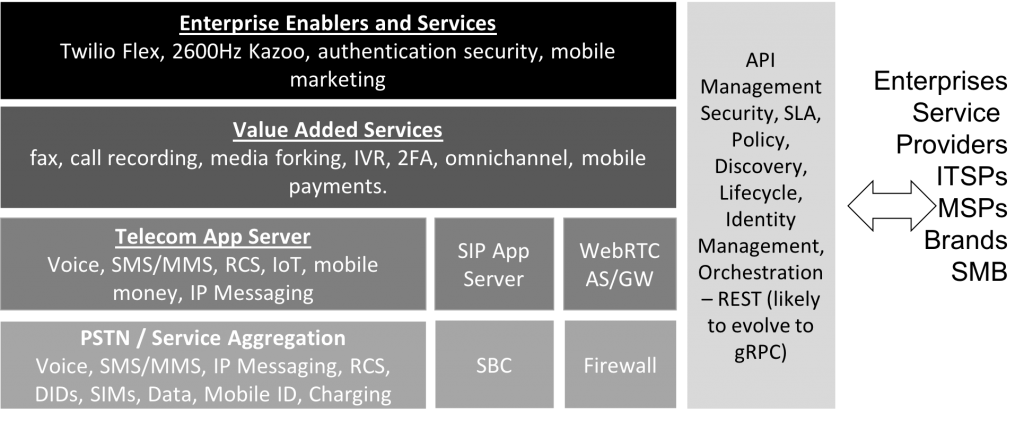 I was fortunate to be invited to take part in a conversation with Dave Michels and Evan Kirstel, TalkingHeadz.
I was fortunate to be invited to take part in a conversation with Dave Michels and Evan Kirstel, TalkingHeadz.
The focus was: what is a CPaaS (Communications Platform as a Service)? I consider the term CPaaS to be as dumbass as Cloud Communications. They were both created when referring to cloud was ‘essential marketing cool’. And also because marketing people are too scared to use the T-word, preferring ‘communications’ instead of ‘telecoms’ because is sounds like telcos. Telecoms and Telco are different! Telecoms existed BEFORE telcos. I use the term Telecom APIs and Programmable Telecoms. I prefer the latter as its easy to understand, avoids yet more bloody acronyms, and covers the broader market than just cloud based telecom API service providers (CPaaS).
Dave asked if I have a definition of CPaaS, I do not as its a marketing contrivance. But I do have a general architecture of what makes up a CPaaS provider, as shown in the picture at the start of this weblog. There are 5 layers:
- Aggregation across PSTN (telephony, SMS, DIDs), internet-based telecom services (Viber), SIP and WebRTC.
- Telecom App Server, the heart of a CPaaS, think of it as the telecoms version of a web app server. It masks all the geeky telecoms stuff into easy to use web components.
- VAS (Value Added Services). Examples include IVR (press 1 for service) or call redirection (after pressing one the call is redirected to an agent) or anonymous calling (like with Uber when the driver is trying to find you after they arrive at the destination and an anonymous call is set up between you and the driver).
- Enterprise enablers / services. The difference between these two is more a business decision than technology. It can range from pre-packaged services delivered directly to enterprises or through channels (e.g. the services in VoIP Innovations Showroom, or Kazoo by 2600Hz), or enabling partners to build their own version of an enterprise service (e.g. Twilio Flex for Call Centers)
- There’s also all the business and operational support stuff including API Management, billing, security, etc. Any public service needs these components.
An important point came up in the conversation that there are CPaaS providers (Nexmo, CLX, VoIP Innovations) and CPaaS Enablers (Telestax RestcommOne, hSenid Mobile, Ribbon Kandy, Asterisk, FreeSWITCH). The enablers provide most of the technology to make being a CPaaS possible. The dividing line between provider/enabler is a little blurry, as Kandy could be hosted on behalf of the telco (Kandy is a telco focused CPaaS enabler).
Also open source projects like Asterisk, FreeSwitch and Restcomm provide the TAS and some VAS, but additional components are required to make a CPaaS possible. Hence why Telestax built RestcommOne, and why VoIP Innovations bought Apidaze so it now has a successful CPaaS business. I recommend anyone considering CPaaS enablers consider hSenid Mobile, they’re quite advanced with a complete solution necessary to engage a whole country in programmable telecoms, as evidenced by the success of IdeaMart in Sri Lanka.
We then ran through a number of companies on whether they are a CPaaS or not, from McDonald’s (clearly not), through some well-known CPaaS providers, to some interesting edge cases. You can watch the chat on TalkingHeadz.
For more information on the history of CPaaS checkout this ebook: “The Enterprise Telecoms Revolution: A Potted History of CPaaS” from VoIP Innovations. Or on this weblog.
At TADHack Global on the 13-14 Oct people around the world can experience firsthand CPaaS, CPaaS enablers, chat bots, Ethereum, and much more. TADHack is for Everyone, whether you’re a coder or non-coder, it doesn’t matter. We want you to learn about some great technologies, share your experiences with others, and create something over a weekend that could change the world. Seriously, companies have been founded from TADHack, new services created and later launched, people have found amazing jobs working with world-leading teams. TADHack Global gives you unmatched hand-on experience, discover more here. Thanks to Apifonica, Status and VoIP Innovations for sponsoring TADHack Global 2018.
At TADSummit 13-14 November you’ll meet the people leading the Programmable Telecom revolution as well as the channels delivering the revolution to enterprises large and small around the world. You’ll see what’s possible before the rest of the industry because TADSummit is the thought-leadership event in programmable telecoms, now in its 6th year. Check more information here. Thanks to Apifonica, tyntec, VoIP Innovations for sponsoring TADSummit 2018.
